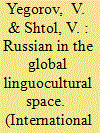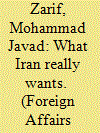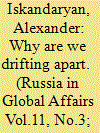|
|
|
Sort Order |
|
|
|
Items / Page
|
|
|
|
|
|
|
| Srl | Item |
| 1 |
ID:
090788


|
|
|
|
|
| Publication |
2009.
|
| Summary/Abstract |
This paper, therefore, attempts to analyse the scope and role of cross-border cultural exchanges, making a few observations on their usefulness and limitations. In particular, it is important to assess whether the pursuit of a common South Asian identity- especially among bitterly divided neighbours- is achievable through cultural exchanges or not.
|
|
|
|
|
|
|
|
|
|
|
|
|
|
|
|
| 2 |
ID:
189194


|
|
|
|
|
| Summary/Abstract |
At the same time, according to the degree of its presence in the global linguistic space, Russian comes fourth after French, English, and Indonesian. There are 3.5 persons speaking French for each native speaker of the French language; the correlation is 3.3 for the English language and 2.9 for Indonesian. In this respect, Russian comes close to German: There are 1.7 German speakers per native speaker of German and 1.67 Russian speakers per native speaker of Russian.
|
|
|
|
|
|
|
|
|
|
|
|
|
|
|
|
| 3 |
ID:
130467


|
|
|
|
|
| Publication |
2014.
|
| Summary/Abstract |
Foreign policy is a critical component in the lives, conduct, and governance of all nation-states. But it has become even more significant in recent years as interstate relations have grown ever more complex. The inexorable rise in the number of international players -- including multilateral organizations, nonstate actors, and even individuals -- has further complicated policymaking. Meanwhile, the ongoing process of globalization -- however conceived and defined, whether lauded or despised -- has brought its inescapable weight to bear on the foreign policies of all states, whether large or small, developed or developing.
Since its establishment by a popular revolution in 1979, the Islamic Republic of Iran has grappled with these challenges. The postrevolutionary foreign policy of Iran has been based on a number of cherished ideals and objectives embedded in the country's constitution. These include the preservation of Iran's independence, territorial integrity, and national security and the achievement of long-term, sustainable national development. Beyond its borders, Iran seeks to enhance its regional and global stature; to promote its ideals, including Islamic democracy; to expand its bilateral and multilateral relations, particularly with neighboring Muslim-majority countries and nonaligned states; to reduce tensions and manage disagreements with other states; to foster peace and security at both the regional and the international levels through positive engagement; and to promote international understanding through dialogue and cultural interaction.
|
|
|
|
|
|
|
|
|
|
|
|
|
|
|
|
| 4 |
ID:
127048


|
|
|
|
|
| Publication |
2013.
|
| Summary/Abstract |
The paradigm of modernity, which implies the existence of nation states as the groundwork of political world order, often looks obsolete these days or at least out of fashion, despite its etymology. The originally successful attempt to pour new wine into old wineskins did not help: starting from a certain point both Europe and the Americas began to regard as the basis of nation states not ethnicity, but rather ways of people's self-organization irrespective of their ethnic or cultural background, race or religion. However, even this dramatic transformation has not made the modernity vision of politics less outdated. Today it is contrasted with the postulate that the contemporary world is moving towards globalization, internationalization and cosmopolitanization of everything around - from decision making in politics and the economy to the mechanisms of cultural interaction.
|
|
|
|
|
|
|
|
|
|
|
|
|
|
|
|
|
|
|
|
|